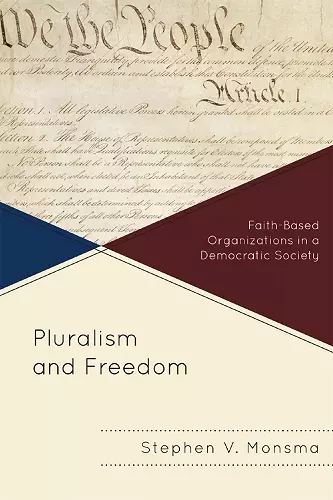Pluralism and Freedom
Faith-Based Organizations in a Democratic Society
Format:Hardback
Publisher:Rowman & Littlefield
Published:9th Dec '11
Currently unavailable, and unfortunately no date known when it will be back
This hardback is available in another edition too:
- Paperback£41.00(9781442214316)

Faith-based organizations play a major role in providing a host of health, educational, and social services to the public. Nearly all these efforts, however, have been accompanied by intense debate and numerous legal challenges. The right of faith-based organizations to hire based on religion, the presence of religious symbols and icons in rooms where government-subsidized services are provided, and the enforcement of gay civil rights to which some faith-based organizations object all continue to be subjects of intense debate and numerous court cases. In Pluralism and Freedom, Stephen V. Monsma explores the question of how much autonomy should faith-based organizations retain when they enter the public realm? He contends that pluralism and freedom demand their religious freedom be respected, but that freedom of all religious traditions and of the general public and secular groups be equally respected, ideals that neither the left nor the right live up to. In response, Monsma argues that democratic pluralism requires a genuine, authentic—but also a limited—autonomy for faith-based organizations providing public services, and offers practical, concrete public policy applications of this framework in practice.
In this book Monsma (emer., Pepperdine Univ.) examines the contentious issue of the proper place of faith-based organizations (FBOs) in the public square in the US through the important lenses of freedom, pluralism, tolerance, and diversity. In particular, Monsma wants to determine how much religious autonomy FBOs should legally retain when entering into the public sphere, and how much religious diversity and pluralism should be willingly accepted in the public realm. Monsma correctly asserts that answering these questions is crucial given the large role that FBOs play in critical areas of US public life, and also convincingly argues that current thinking across the ideological spectrum is of little use in providing usable answers. In his attempt to address this dilemma, Monsma turns to western Europe, specifically to the Roman Catholic teaching of subsidiarity, the neo-Calvinist idea of sphere sovereignty, and the tradition of Christian Democracy to flesh out a solution he labels structural pluralism. Structural pluralism reserves an important place in the public realm for all intermediary institutions, religious and nonreligious alike. All will not agree with Monsma's take here, but all will benefit from considering his ideas. Summing Up: Highly recommended. * CHOICE *
In Pluralism and Freedom: Faith-Based Organizations in a Democratic Society, Monsma looks beyond our borders for a fresh perspective on this most contentious issue. * Christianity Today *
The book provides resources such as Supreme Court decisions and information on constitutional interpretations of religious freedom that will be useful for readers of any political background....the assembly of primary sources will be useful for readers from all parts of the political spectrum. * Conscience *
Monsma's recent book Pluralism and Freedom: Faith-Based Organizations in a Democratic Society, examines the challenges confronting faith-based services that are funded by the United States government. . . . His work complements a growing body of existing research that explores church-state responses in conditions of diversity across the United States, Europe and other parts of the world. Monsma's work will be of interest to those scholars who closely follow religion and politics issues and church-state issues literature. ... The book successfully describes the challenges of protecting religious freedom for all. The idea that an overarching framework or standard can be developed to safeguard the freedom of persons and organisations of all religions is laudable and worthy. . . . The book marks a fresh direction for church-state research. * Journal of Social Policy *
Few scholars have thought harder or more productively than Steve Monsma about the role of faith-based organizations in our pluralistic democracy. Pluralism and Freedom brilliantly reflects his years of research and philosophical probing. Many conservatives will find his ideas attractive, but I especially recommend his book to liberals who may well disagree with him, but will find themselves challenged by Monsma’s compassionate heart and searching mind. -- E. J. Dionne Jr., author of Why Americans Hate Politics and They Only Look Dead
Our society counts on flourishing faith-based service organizations. However, the religious freedom—the autonomy—they need in order to play their important roles is not so well understood. Stephen V. Monsma’s path-breaking book identifies key issues and controversies and recommends policies that will enable these vital groups to continue to make their uncommon contributions to our common good. -- Stanley Carlson-Thies, Institutional Religious Freedom Alliance
Monsma is the dean of scholars who study religion and politics in America. You don’t need to agree with all or even most of his policy-relevant conclusions to marvel at the deep erudition, moral balance, and civic spirit that inform each and every page of Pluralism and Freedom. And you can’t claim to have a truly informed and considered opinion on the most controversial church-state issues of our day unless you have read this latest gem of a book by Monsma. -- John J. DiIulio, Jr., former director, White House Office of Faith-Based and Community Initiatives
In his previous seminal contribution Positive Neutrality: Letting Religious Freedom Ring, Stephen Monsma helped to establish the legal and philosophical grounding of today's much-debated "faith-based initiatives." With Pluralism and Freedom: Faith Based Organizations in a Democratic Society, Monsma has advanced the debate again by probing the conflicting "liberal" and "pluralist" understandings of religion and religious communities at the heart of the constitutional and political struggle over the public role of faith-based organizations. Carefully and sympathetically, Monsma defines a reasonable policy balance between these conflicting worldviews, moving today's relatively more accommodating church-state framework one step closer toward consensus.” -- Lew Daly, Senior Fellow at Demos and author of God and the Welfare State
ISBN: 9781442214309
Dimensions: 240mm x 162mm x 21mm
Weight: 508g
238 pages